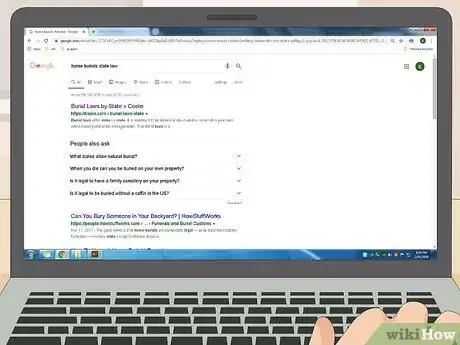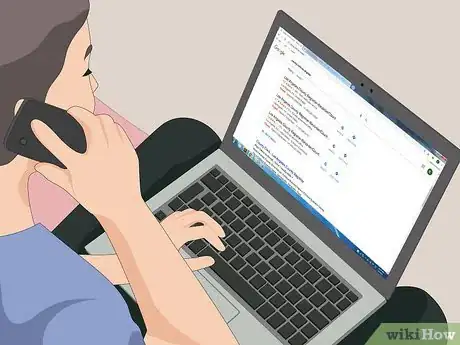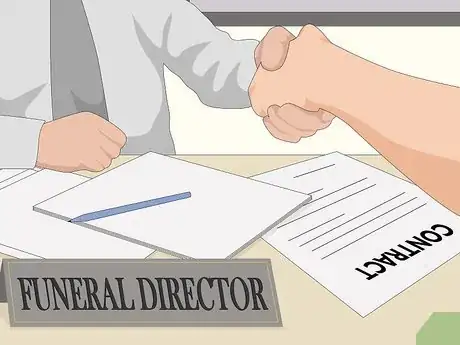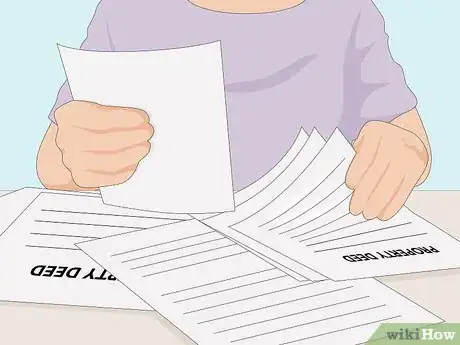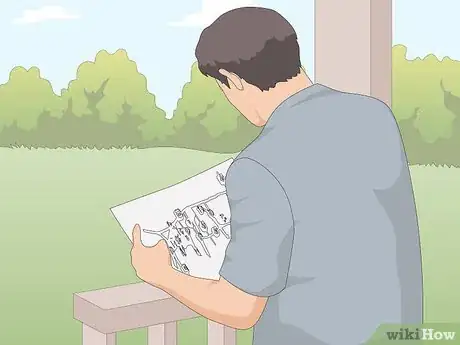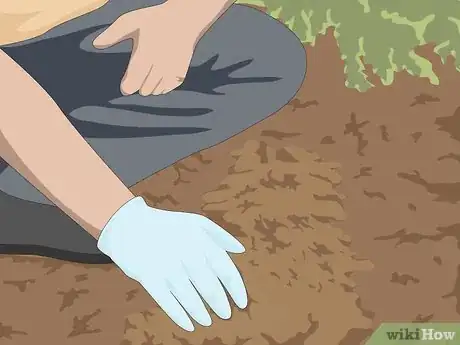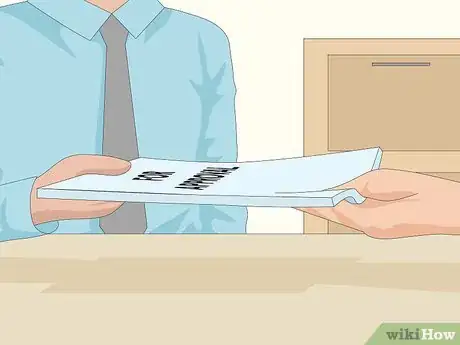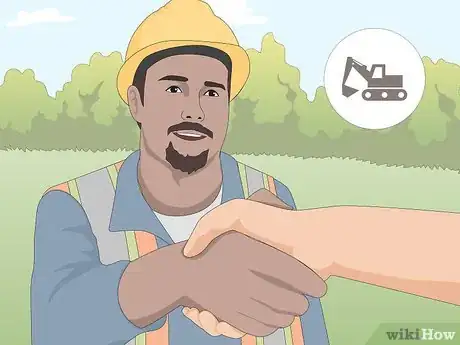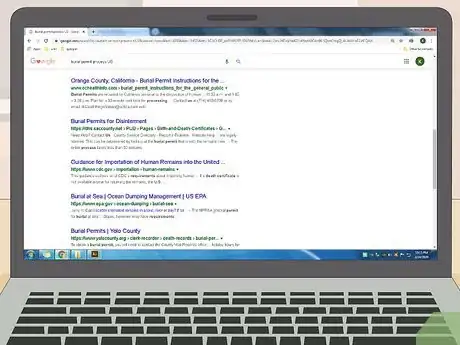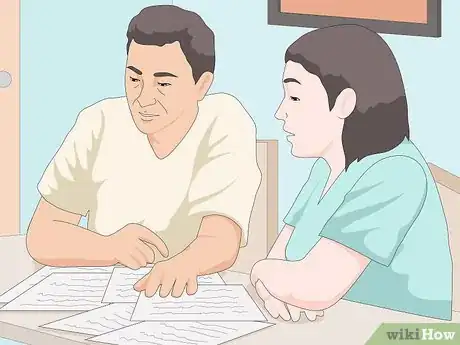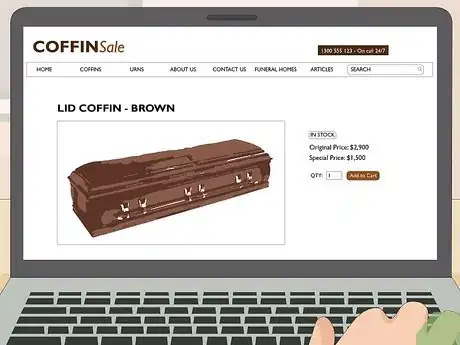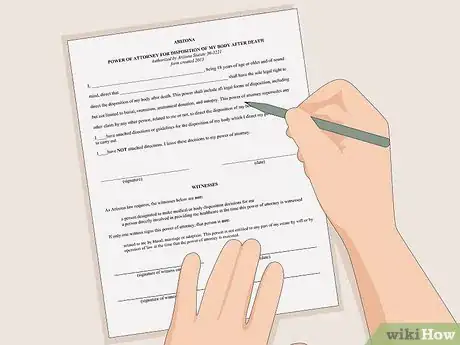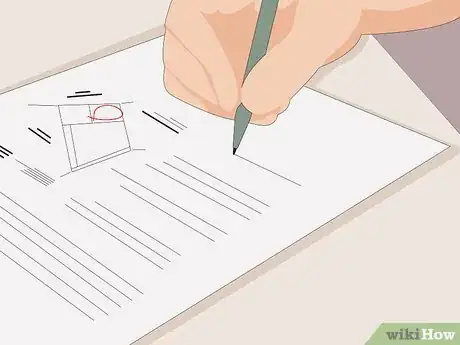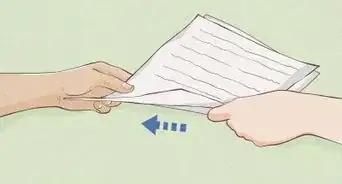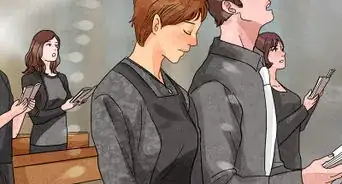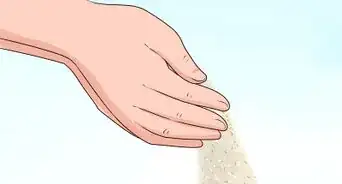This article was written by Jennifer Mueller, JD. Jennifer Mueller is an in-house legal expert at wikiHow. Jennifer reviews, fact-checks, and evaluates wikiHow's legal content to ensure thoroughness and accuracy. She received her JD from Indiana University Maurer School of Law in 2006.
This article has been viewed 8,857 times.
Many Americans are turning to home burials as a green alternative to a crowded commercial cemetery. A home burial is also a more intimate and personal experience that can provide a lot of healing and closure to grieving family members. Most states in the US allow you to be buried on your own property, provided you hold the deed to the land and live in a relatively rural area. However, state and local regulations vary greatly. While death and burial can be a difficult and sad thing to talk about, planning your burial ahead of time can ease the burden on your family after your passing.[1]
Steps
Complying with State and Local Regulations
-
1Determine the law in your state for home burials. In the US, home burials on private property are a matter of state or local law. Your state may fall into one of 3 broad categories:[2]
- No home burials: A few states, including California, Indiana, and Washington, do not allow home burials on private property.
- Home burial with professional oversight: Some states require you to hire a funeral director to oversee the burial. These states include Alabama, Connecticut, Illinois, Michigan, New Jersey, and New York.
- No home burial laws: Many states have no specific state laws regarding home burial. There may still be local ordinances.
Tip: Even if your state's law doesn't specifically address home burial, other state laws regarding burial generally, such as the depth of the grave or the location of the gravesite, would still apply.
-
2Find out which government agencies you need to work with. In many states, the department of health regulates burials. However, some states may have a separate board. The easiest way to find out which government agencies you would need to work with to coordinate a home burial is to call your city or county clerk's office.[3]
- Search online for "county clerk" along with the name of your county and state to find the clerk's website. There will be contact information listed. When you call, ask which agency regulates funerals and burials in your county.
Advertisement -
3Choose the funeral director you want to oversee your burial. If your state requires a funeral director to oversee your home burial, you may want to set up a contract in advance so that you know that your burial desires will be fulfilled. Even if you don't ultimately sign a contract, a funeral director with experience in home burials can still give you a lot of information and help you determine what arrangements you need to make in advance.[4]
- The National Home Funeral Alliance (NHFA) has a directory of funeral directors and other experts who conduct home funerals. Visit https://www.homefuneralalliance.org/directories.html#!directory to search the directory for local professionals who can help you plan your home burial.
- If you don't want to hire a funeral director in advance, let designated family members know that they'll need to hire someone to oversee the burial.
Choosing a Suitable Location
-
1Check your property deed for any restrictions. Your deed specifies the boundaries of your property, so you can make sure you don't choose a site that's technically over your property line. Additionally, any restrictions on your deed could limit the places on your property where you could be buried.[5]
- For example, if your neighbor has an easement allowing them to access a certain part of your property, you may not be able to use the property subject to the easement as a burial site.
- If you have any questions or concerns about the description of your property in your deed, you may want to talk to a lawyer who specializes in real estate and property law. They may advise you to get a survey done before you make a final decision on a burial site.
-
2Identify water sources that may limit your potential burial sites. Because there is a potential that bacteria and viruses from human remains to enter the groundwater and infect people, all states have requirements that burial sites be far enough away from water sources to alleviate these health concerns. The specific distance required varies among states and localities.[6]
- For example, in Massachusetts, you cannot use a burial plot within 200 feet (61 m) of rivers or within 100 feet (30.5 m) of the high-water mark of any other public water source.
- You also want to take care that the site is not in a flood plain, which could result in the site being flooded and destroyed.
Tip: If you have a family well on your property, review setback requirements for the distance of the burial site from the well to make sure your private water source isn't potentially contaminated.
-
3Hire a soil evaluator to evaluate the suitability of the site. A geological evaluation determines the high groundwater level and depth to bedrock. A soil evaluator will also profile the soil variability and consistency to determine whether it is suitable for a burial site.[7]
- For example, you wouldn't want a burial site with loose, sandy soil because it can easily erode, exposing the burial.
- If the site you've chosen is on a slope, the evaluation will also determine if the slope is stable enough to support a burial without the risk of exposure from run-off and erosion.
Tip: If your groundwater levels are high, you may be required to use a concrete vault to prevent contamination.
-
4Get your chosen site approved by local authorities if necessary. In some states and localities, a local board in charge of burials needs to approve the specific site where you want to be buried on your property. The board may have specific studies or evaluations that you must have done before your site will be approved.[8]
- You typically won't have to pay a fee for permission from the board, although you will have to pay for a certified professional to evaluate the site and produce a report for the board's review.
-
5Enter a contract with an excavator. Moving enough dirt for a burial plot is a massive task, and likely not one you want to leave to your family members. If you hire an excavator to dig the grave, you can be certain that the dig is professional and meets your state's specifications.[9]
- Keep in mind that although the excavator will dig the hole for the grave, they typically will not return to replace the dirt. Your family members may be responsible for refilling the hole with shovels and similar tools.
Making Burial Arrangements
-
1Designate a family member to facilitate the death certificate. The state won't allow your body to be buried until a death certificate has been issued. Typically, your next-of-kin will get a report from a nurse or doctor that they'll use to have the death certificate issued.[10]
- You may want to designate more than one person, in case your first choice isn't available.
- Contact your state's department of health and find out how a person can get a death certificate issued. Then write down the steps, including the information or documents the person will need. Give this to the family member you've chosen to handle this matter so they'll know what to do.
Tip: Some states only allow licensed funeral directors, embalmers, or other funeral professionals to order the issuance of a death certificate.
-
2Find out the process for getting a burial permit. Even if your chosen gravesite has already been approved, some states require your designated family member to get a burial permit before they can bury your body. The burial permit typically isn't issued until after your death is confirmed.[11]
- The burial permit is typically issued by the local board of health. It may be the same office that issues the death certificate.
- You typically can't get burial permits in advance, but it's a good idea to get this information for your designated family member so they know what to do.
-
3Discuss your preferences for preparing your body for burial. Talking about your burial can be a difficult conversation to have. However, particularly if you want to be buried on your own property, it's important that your closest family members know what you want well in advance.[12]
- Most states don't actually require bodies to be embalmed prior to burial, so if that's not something you want, you can skip it. If you want a more traditional burial with a shroud, for example, you can typically do this. You just have to let your family members know what you want.
- Following a death, your next-of-kin will likely be connected immediately to a funeral director to make arrangements. If they don't know what you want or that you've already chosen and prepared a site, you may not get the final resting place you want.
- In addition to the person you've designated to facilitate the death certificate, it's a good idea to let other close family members know your preferences. For example, you might invite family over for dinner and then take them out to see the site you've chosen. Then, you can explain that you want to be buried there.
-
4Choose the coffin you want for your burial. If you're having a home burial, you don't necessarily need the expensive caskets, liners, and other products that may be required for burial in a public cemetery (although you can certainly have them if you want). However, home burials typically use more simple products that are more environmentally friendly and allow for a more natural burial.[13]
- You can order basic cardboard or wood coffins online if you want. While it may seem somewhat morbid to order your coffin in advance, it does allow you to pick out the one you want. If you're focused on an environmentally friendly burial, make sure you choose a coffin that is biodegradable.
-
5Document your decisions apart from your will or trust. If you have a will, chances are it won't go through probate until long after you've passed. That would be too late to communicate your burial preferences. Create a separate document and make sure designated family members have copies of it.[14]
- The Funeral Consumers Alliance has forms you can use to document your final wishes available at https://funerals.org/?consumers=legal-right-make-decisions-funeral. Make sure you choose the right form for your state. If there's no form specific to your state, you can use the generic blank form.
Tip: In most states, your family members are legally required to honor your decisions regarding your funeral as long as they aren't illegal or impractical.
-
6Add information about the gravesite to the property deed. State law prohibits gravesites from being disturbed, even if your property is later sold. However, the deed should state exactly where the gravesite is located on the property.[15]
- Contact your county's register of deeds for a form to amend your deed. Typically, a hand-drawn map of your property is sufficient to mark a gravesite. If you had a survey of your property done, you can also mark the gravesite on the survey map.
Warnings
- This article discusses how to be buried on your own property in the US. If you live in another country, the rules may be different. Contact your local department of health for more information.⧼thumbs_response⧽
- Laws referenced in this article are accurate as of December 2019. Check with the government agency that regulates burials in your state for the most up-to-date rules and regulations for home burial.⧼thumbs_response⧽
References
- ↑ https://www.funerals360.com/blog/cemetery/things-to-consider-for-home-burials/
- ↑ https://www.funerals360.com/blog/cemetery/things-to-consider-for-home-burials/
- ↑ https://www.motherearthnews.com/nature-and-environment/nature/private-burial-zm0z11zmat
- ↑ https://www.mass.gov/info-details/information-for-local-boards-of-health-on-home-burials-and-green-burials
- ↑ https://www.motherearthnews.com/nature-and-environment/nature/private-burial-zm0z11zmat
- ↑ https://www.mass.gov/info-details/information-for-local-boards-of-health-on-home-burials-and-green-burials
- ↑ https://www.mass.gov/info-details/information-for-local-boards-of-health-on-home-burials-and-green-burials
- ↑ https://www.mass.gov/info-details/information-for-local-boards-of-health-on-home-burials-and-green-burials
- ↑ https://www.motherearthnews.com/nature-and-environment/nature/private-burial-zm0z11zmat
- ↑ https://www.mass.gov/guides/issues-to-consider-in-preparing-for-disposition-of-decedents
- ↑ https://www.mass.gov/guides/issues-to-consider-in-preparing-for-disposition-of-decedents
- ↑ https://www.funerals360.com/blog/cemetery/things-to-consider-for-home-burials/
- ↑ https://www.funerals360.com/blog/cemetery/things-to-consider-for-home-burials/
- ↑ https://funerals.org/?consumers=legal-right-make-decisions-funeral
- ↑ https://www.funerals360.com/blog/cemetery/things-to-consider-for-home-burials/
